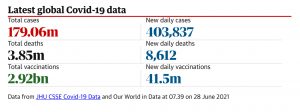Analysis: research suggests ‘scarily fleeting’ contact could infect, and that places with high jab rates are susceptible
 Sydney and some of its surrounding areas have imposed a strict two-week lockdown in an effort to curb the spread of the Delta variant. Photograph: Brook Mitchell/Getty Images
Sydney and some of its surrounding areas have imposed a strict two-week lockdown in an effort to curb the spread of the Delta variant. Photograph: Brook Mitchell/Getty Images
The transmission advantage of the Delta variant that is spreading at pace globally is a sign that the race between vaccination and the virus could tip in favour of the latter unless countries ramp up their immunisation campaigns and practise caution, scientists say.
The variant, first detected in India, has been identified in at least 92 countries and is considered the “fittest” variant yet of the virus that causes Covid-19, with its enhanced ability to prey on the vulnerable – particularly in places with low vaccination rates.
Research conducted in the UK, where the variant accounts for 99% of new Covid cases, suggests it is about 60% more transmissible than the Alpha variant, which previously dominated. It may also be linked to a greater risk of hospitalisation and is somewhat more resistant to vaccines, particularly after one dose.
This is the problem with hanging everything on vaccines until you’ve got something near a population immunity threshold … you need a much higher coverage to protect against a variant that’s more transmissible,” said Dr Stephen Griffin, a virologist and associate professor at the University of Leeds school of medicine.
“It just speaks to the fact that we really, really must keep cases down at the same time as rolling the vaccines out.”
The calls for caution come at a time when research in Australia indicates just how easily the Delta variant can potentially spread. Based on CCTV footage, health officials suspect it has been transmitted in “scarily fleeting” encounters of roughly five to 10 seconds between people walking past each other in an indoor shopping area in Sydney in at least two instances.
There were no mask mandates in place in Sydney at the time, and the individuals were unlikely to have been vaccinated given that less than 5% of the Australian population have received both doses. The city and some surrounding areas entered a strict two-week lockdown on Saturday in an effort to curb the spread of the Delta variant.

It is clear that Delta has a substantial transmission advantage, but scientists have not yet established why. Prof Catherine Noakes, a member of the UK’s Scientific Advisory Group for Emergencies (Sage) and an expert in airborne infections at the University of Leeds, suggested three possible reasons: that the people it infects have a higher viral load, meaning they would emit more particles; that people need to be exposed to less of the virus to become infected; or that a relatively short exposure time to an infected person is enough to spread the disease.
It is possible that a person could be infected by being close to a carrier for a few seconds, if the carrier were to exhale a load of virus particles and the person just happened to breathe in at exactly the wrong moment, she said.
“What it doesn’t necessarily mean is that it’s transmitting that way all the time for everybody. It may well just be one of these really unlucky events.”
The World Health Organization is urging even fully vaccinated people to “play it safe” by continuing to wear masks, maintain social distance and practise other safety measures, to deal with the Delta variant.
Israel, where about 55% of the population has been fully vaccinated, reimposed its mask mandate on Friday to combat the rapid rise in Delta cases just 10 days after having lifted it. Infections more than quadrupled last week, attributed to two school outbreaks. Eligibility for the vaccine was extended to 12- to 15-year-olds last month, but take-up in the age group has been low.
The rise in cases in Israel has not yet translated into an increase in hospital admissions and deaths, so the move is likely to be a precautionary one, Noakes said.
“The virus is circulating in society, so even if you’ve not got high numbers of deaths, it still causes quite a lot of disruption, people having to isolate, people getting sick, people with long Covid,” she said.
Griffin said: “The ideal scenario is that you build your vaccine wall before you get exposed to variants because that means that even if you do get an outbreak, you’ve got sufficiently few people that are susceptible that the R [reproduction number] never gets above 1, you don’t see an increase in that outbreak.
“The problem is that we haven’t reached that protective level, and so if you do get infections and cases growing there’s plenty of susceptible people to pass that infection on to.
“This is sign … that we must go belt and braces in all of this. There’s no point leaving it half done – we can’t ignore children in vaccination campaigns,” he said. “If we do, then we could end up in a cycle of variants.”
Post Views: 688
 Sydney and some of its surrounding areas have imposed a strict two-week lockdown in an effort to curb the spread of the Delta variant. Photograph: Brook Mitchell/Getty Images
Sydney and some of its surrounding areas have imposed a strict two-week lockdown in an effort to curb the spread of the Delta variant. Photograph: Brook Mitchell/Getty Images

Leave A Comment